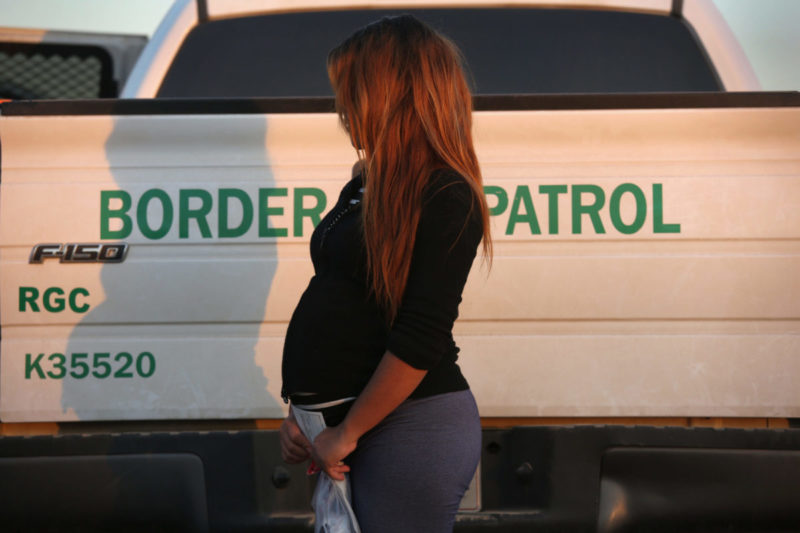Biden Says the US Will No Longer Detain Pregnant Migrants. Don’t Be Fooled.
Without a plan to transform the immigration system, the Biden administration's policy change mostly serves as a cover for ongoing family separation.

Friends and family members have been sending me links to news stories about the Biden administration’s recent announcement that it will no longer detain most migrants who are pregnant, recently postpartum, or nursing. They know that I study the experience of pregnancy in immigration detention, and want to share what seems like good news.
My reaction might surprise them.
Of course it is a good thing for fewer pregnant, postpartum, or nursing people to be detained. It is always a good thing for fewer people to be detained, and it is especially important to protect the health of pregnant people and the unique bond that newborns have with their parents.
On its face, the administration’s announcement seems like a positive step in the right direction. But without meaningful action to fundamentally transform our immigration enforcement system, this change mostly serves as a cover for ongoing family separation and other forms of reproductive injustice.
My understanding of immigration policy as reproductive injustice is deeply informed by the work of the Black feminist SisterSong Collective and other reproductive justice advocates of color, as well as my own experience as a midwife in a border community. SisterSong defines reproductive justice as “the human right to maintain personal bodily autonomy, have children, not have children, and parent the children we have in safe and sustainable communities.” This holistic vision of reproductive well-being provides a necessary counterpoint to a white feminist pro-choice movement that has historically left out the voices of Black women and other women of color. U.S. history is rife with examples of reproductive injustice perpetrated against women of color.
There is a direct link from the forced sterilizations and punitive welfare laws of the past to the devastating consequences that harsh immigration laws have on migrant and mixed-status families today.
I saw those consequences firsthand as a midwife working in community health in southern Arizona. I have had several patients miss prenatal appointments because their partner was detained, often during a traffic stop. In one case that I remember vividly, my patient’s partner was facing potential jail time and the possibility of deportation for the crime of having undocumented family members in his car. In these cases, pregnant people were left scrambling for income, child care, and transportation help, fearful for their partners’ well-being and struggling to care for other children while preparing to give birth. Their children did not know when their dad would be home, if ever. This is reproductive injustice.
Since Biden took office, his administration has deported or expelled almost 600,000 people, each one of these deportations or expulsions a potential family separation. Even if a pregnant migrant apprehended at the border is not detained, if they are separated from their partner and sent to detention, that is reproductive injustice. (Last year, I spoke to someone in those exact circumstances who didn’t know where her partner was or whether he was alright. She had no way to contact him.)
When a teenage girl is warehoused in a crowded, unsanitary detention camp staffed by untrained contractors who ignore her when she tells them she is having profuse vaginal bleeding—that is reproductive injustice. The nonconsensual gynecological procedures performed on pregnant people detained at Irwin Detention Center in Georgia, which in some cases ended their fertility, were a form of reproductive injustice. None of these circumstances would be prevented by the Biden administration’s recently announced policy change, which barely scratches the surface of the deep disregard our immigration system has for the well-being of families, parents, and children.
As Adam Serwer wrote, for the Trump administration, the cruelty was the point. Trump used inhumane policies like the family separations of summer 2018 to communicate to his base that he was tough on migrants and would make no exceptions. Trump explicitly engaged in racist rhetoric that cast pregnant migrant women as the carriers of “anchor babies” whose birth in the United States was a threat to a white-majority ethnostate. In late 2017, the Trump administration rescinded the Obama administration’s “presumption of release” policy and began detaining significantly more pregnant migrants. Pregnant people were sacrificed to make his point.
The Obama and Biden administrations, on the other hand, engage in a different kind of rhetorical game. They express public concern about migrants’ well-being and cultivate good press about “humanitarian exceptions” to immigration policy in a bid to put their supporters’ consciences at ease. They put a benevolent veneer on an inhumane system. I am certainly not arguing that the Biden and Trump administrations are equal in their cruelty toward migrants. Trump was worse. But both administrations, each in their own way, have used pregnant people as a convenient political prop.
Reproductive justice is a human right. Those of us who believe this must not be lulled into complacency by the announcement of cosmetic adjustments to immigration policy. We must continue to pressure the Biden administration and Congress to protect migrant families by making meaningful, lasting change.

